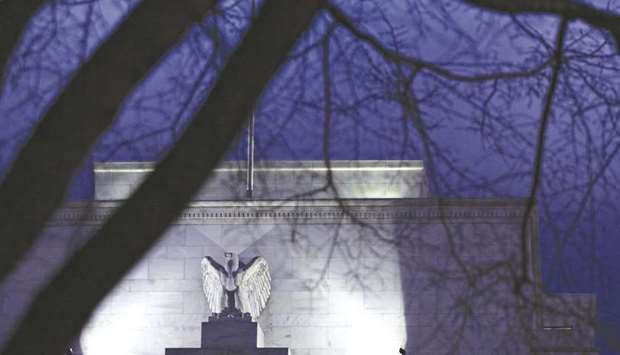The Federal Reserve will leave interest rates unchanged at its meeting this week while staying on track to lift its benchmark lending rate by a quarter percentage point in December, according to a Bloomberg survey of 42 economists.
Results of the survey, conducted September 12-14, showed economists also widely expect Fed officials to begin winding down their $4.5tn balance sheet in October, and will announce that timing at 2pm tomorrow after their two-day meeting in Washington.
“While transitory factors may stay the Fed’s hand in the short-term, the path to normalization of the fed funds target range should continue in December,” said Scott Anderson, chief economist at Bank of the West, in San Francisco.
Concern the Fed might delay a third rate hike this year following a spate of weak inflation readings eased after the consumer price index rose 1.9% in the 12 months through August. Just 20% of survey respondents said the risks for growth and inflation lie mainly to the downside, the lowest in a Bloomberg survey since March.
In line with that, 75% of respondents said the Fed wouldn’t change its post-meeting statement to reflect growing concerns over inflation, up from 67% in a July survey.
“The recent CPI number may have provided some confirmation that things aren’t as bad as people feared,” said James Orlando, a senior economist at TD Bank in Toronto.
Respondents say the Fed will slightly shift the projected path of rates when they release an updated set of quarterly economic projections following the FOMC meeting. Economists said the Fed will still pencil in three hikes for 2018, but with the first of those not projected until June, versus March in the Fed’s previous set of forecasts. Economists also lowered the level at which they expect rates to crest in this tightening cycle to 2.75% from 3%, with that peak seen coming in the fourth quarter of 2019. They also expect Fed officials to trim their estimate for the long-run rate of unemployment to a median 4.5% from 4.6%.
The long-run rate represents the level below which officials believe unemployment becomes inflationary. A lower estimate of long-run unemployment could explain why low unemployment hasn’t yet triggered higher inflation, and justify the Fed keeping rates low to run the economy a little hotter.
Unemployment has dropped near to a 16-year low of 4.4%, while the Fed’s preferred gauge of 12-month inflation has remained under its 2% target for most of the last five years. During that same period, the Fed’s estimate of long-run unemployment has dropped almost a full percentage point.

A view of the Federal Reserve building in Washington, DC. The results of a recent survey shows economists widely expect Fed officials to begin winding down their $4.5tn balance sheet in October, and will announce that timing tomorrow after their meeting in Washington.
